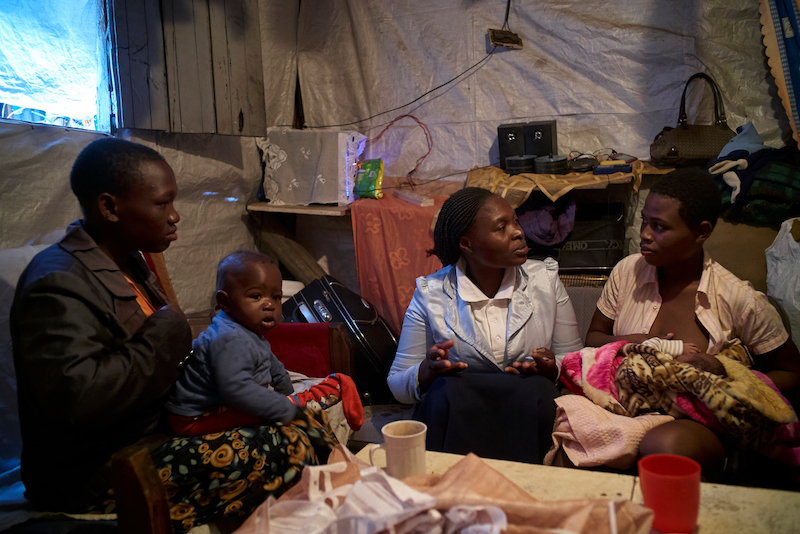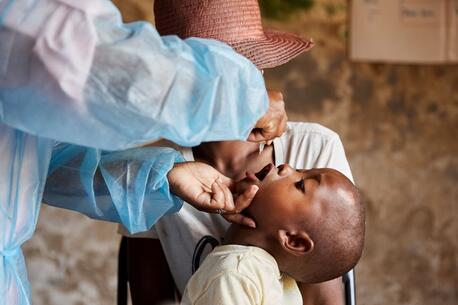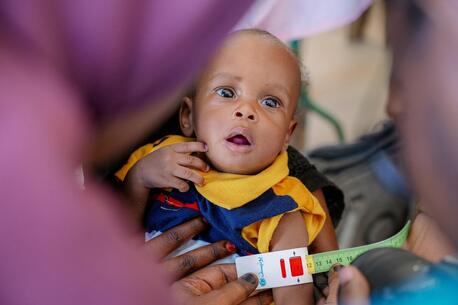
Breastfeeding Gives Children Everywhere a Healthy Start in Life
UNICEF and partners offer nursing mothers around the world the support they need to help their babies thrive.
All mothers want to provide their children with the building blocks of a bright, healthy future. To help babies get the best possible start in life, UNICEF and the World Health Organization have launched the Global Breastfeeding Collective, which works with non-governmental organizations, academic institutions and donors to educate mothers on the importance of breastfeeding and help them receive the financial, emotional and public support they need to successfully nurse their babies. Feeding within the first hour of life, exclusively breastfeeding for the first six months and breastfeeding up until 2 years of age are practices that the collective recommends.
Breastfeeding bolsters brain development, strengthens immunity and even lowers the risk of obesity and other chronic diseases later in life. The most critical time period for ensuring good nutrition in a child’s life is during the first 1,000 days — from the start of a woman’s pregnancy until the child’s second birthday — and breast milk provides all the vitamins, minerals, enzymes and antibodies a baby needs to grow and develop properly.
Breastfeeding benefits the baby, the mother and public health
When mothers breastfeed, they share elements of their immune systems with their babies, leaving them less vulnerable to deadly infectious diseases and less likely to develop allergies. In environments with poor sanitation and unsafe drinking water, breastfeeding also protects children from waterborne illness. In fact, providing support to breastfeeding mothers could cut the incidence of diarrhea by half and respiratory infections by a third, dramatically reducing child mortality.

Susan Ateka (second from right), a UNICEF-supported community health worker, visits Maximila (right) two weeks after she gave birth to her daughter Gloria at home in Mukuru, Nairobi, Kenya. Atseka has visited Maximila regularly since her daughter's birth to encourage her to keep breastfeeding. With no money to pay for infant formula, Maximila was relieved to learn that breast milk is better for Gloria. © UNICEF/UN060141/Noorani
In addition to the benefits it provides for a baby's physical health, breastfeeding increases a child’s cognitive capability and is associated with an IQ increase of 3-4 points on average. This enables children to thrive, do better in school and earn more as adults, making for more robust local and national economies.
Breastfeeding provides many benefits to mothers as well: it helps protect women from breast and ovarian cancer and allows them to better space their pregnancies. Studies have shown that breastfeeding can reduce the risk of heart attack and stroke for mothers, as the increased metabolic rate from breastfeeding helps to eliminate stored fat faster and more completely after pregnancy.
Unlike breast milk substitutes such as powdered milk or baby formula that require water for mixing and energy to produce, breast milk is a natural, renewable, environmentally friendly food. Not only is breast milk healthier than commercially produced infant formula, it's also free, making it dramatically more accessible for mothers and families in the developing world. Yet over the past several decades, there has been a general decline in breastfeeding due to factors such as the production and marketing of manufactured breast milk substitutes to populations.
Despite the benefits, there are challenges to the practice of breastfeeding
UNICEF and partners face two major challenges in expanding the practice of breastfeeding. The first is lack of awareness: governments may not consider breastfeeding a top priority, and therefore may not invest in paid maternity leave, designated breastfeeding spaces or the training of health workers. Low breastfeeding rates currently cost countries more than $300 billion annually in the form of increased healthcare costs associated with malnourished children and reduced economic activity related to early child deaths and adults who are cognitively impaired as a result of poor feeding practices early in life.
Work is the other leading barrier to breastfeeding, contributing to the decision of millions of mothers to stop breastfeeding early in many regions around the world. Only about 10 percent of countries provide paid maternity leave of at least 18 weeks, with pay guarantees when women return to work. Eighty-one countries — including the United States — do not even provide 14 weeks of maternity leave. Once women return to work, many do not have designated spaces to pump and store breast milk.

A working mother, Fiona managed to breastfeed her baby for 28 months, with the support of UNICEF and partners, and her family. UNICEF is working to boost declining breastfeeding rates in China. ©UNICEF/China/2013/Jerry Liu
A growing number of Chinese mothers are overcoming obstacles to breastfeeding their babies when they return to work after maternity leave. Many need to express their milk on the job and carry it home safely. Some have to use bathroom stalls. Others pump under their desks or in mop closets. Quite a few report an onslaught of criticism and even insults from colleagues, friends and family members.
In Changsha, Hunan Province, China, Fiona, a working mother, managed to breastfeed her baby for 28 months, pumping twice a day in the storage room at her office. She did this with help from the “10m2of Love” campaign, launched by UNICEF and partners, which offers a web portal where any organization can register breastfeeding rooms for its staff and patrons. This removes a barrier to breastfeeding that so many women face in middle and high-income countries — and helps restore a sense of self-control and purpose to breastfeeding moms. As Fiona put it, "I made it this far because I gained correct knowledge of breastfeeding."
Photo, top: Heavy fighting drove Rudania and her three children from their home in eastern Aleppo, Syria. Now they live in a rented apartment in an impoverished neighborhood in Damascus. She takes her baby daughter to a UNICEF-supported nutrition center, where mothers and caregivers receive counseling on breastfeeding and infant nutrition. “I am proud of my baby girl and myself. We just got her nutritional screening and she is healthy," Rudaina says with excitement. "It's because I have been breastfeeding her for the past seven months." © UNICEF/UNI193647/Rashidi
HOW TO HELP
There are many ways to make a difference
War, famine, poverty, natural disasters — threats to the world's children keep coming. But UNICEF won't stop working to keep children healthy and safe.
UNICEF works in over 190 countries and territories — more places than any other children's organization. UNICEF has the world's largest humanitarian warehouse and, when disaster strikes, can get supplies almost anywhere within 72 hours. Constantly innovating, always advocating for a better world for children, UNICEF works to ensure that every child can grow up healthy, educated, protected and respected.
Would you like to help give all children the opportunity to reach their full potential? There are many ways to get involved.





